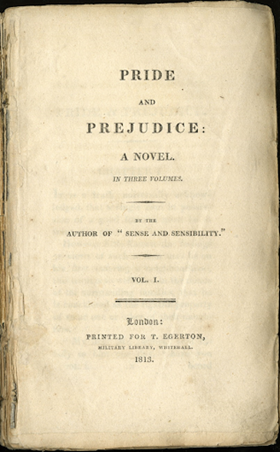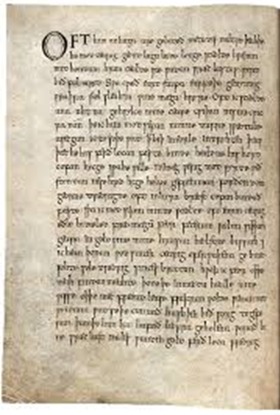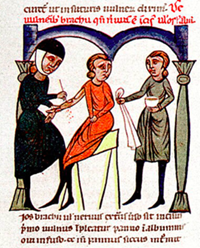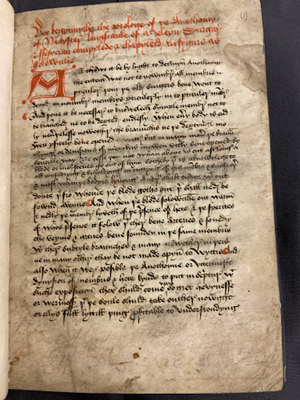Projects
Our staff members run or participate in a number of international research projects. Here are some of our current initiatives:
Dr Joanna Chojnicka - CLADES

CLADES is an Erasmus+ funded project aiming to increase civic engagement and sustainability literacy through Critical Language Awareness (CLA). The key challenges facing democracy today include a lack of citizen engagement, biased access to information, and the rise of populism and anti-immigrant sentiments. In response, many European education systems are prioritizing citizenship education, which focuses on cultivating the knowledge and skills necessary for active participation in democratic life. However, current efforts often overlook the crucial role of communication in shaping democratic processes and addressing societal challenges.
In our information-driven society, issues such as climate change, inequality, and political conflict are shaped by language and visual media. Unfortunately, many future professionals, and the educators who train them, are not fully aware of the power of communication as a tool for social change. This project seeks to increase awareness of how language influences our understanding of the world and how it can be used to promote social justice and sustainability.
Central to the project is the concept of Critical Language Awareness (CLA), which encourages individuals to recognize the impact of language on society and empowers them to use language thoughtfully and strategically. By developing educational resources, online courses, and opportunities for international collaboration, the project aims to foster a sense of agency, showing people that their voices matter and that they can actively shape their communities.
Dr John Flood - Early Modern Irish Writing in English
John Flood is currently finishing an annotated anthology of Early Modern Irish literature written in English. It sets aside the writing of famous colonists such as Spenser and focuses instead on English works written by writers who were born in or educated in Ireland. The anthology includes works of poetry, drama, romance and a variety of work written in prose.
Dr Ann Hoag - Women's Travel Writing
Ann Hoag’s current research continues to explore both women's travel writing and contemporary migrant fiction. Dr Hoag has a book chapter comparing the representation of queer trauma and migration in James Baldwin's Giovanni's Room and Viet Thanh Nguyen's The Refugees to be published this year. In addition, she is working on an article considering Jhumpha Lahiri's translation work as migrating texts to be solidified by the end of the summer. In terms of more historical research, she is working on an article, examining Ménie Muriel Dowie's edited edition of the book Women Adventurers, published in 1893. We are examining in the paper how Dowie negotiates travel discourses for women's narratives through her editorial choices. In addition, Dr Hoah will participate in a continuation of a research project focussing on English-speaking women authors writing about Spain from the late 18th century to the 1950s. Her contribution would be about English, Irish, and American women's representation of the Spanish Civil War in poetry, fiction, and war reportage.
Prof Merel Keijzer - Language learning never gets old*
*In collaboration with: Floor van den Berg (former PhD candidate); Jelle Brouwer (former PhD candidate); Remco Knooihuizen (co-promotor Jelle Brouwer); Hanneke Loerts (co-promotor Floor van den Berg)
Language learning never gets old: Foreign language learning as a tool to promote healthy aging
In this project, which was finished at the end of 2024, we focused on an innovative anti-aging tool: foreign language learning. Research has singled out factors that promote healthy aging. Amidst these activities, lifelong bilingualism has been found especially “sustained, intense, and all-encompassing” (Bialystok, 2016, p. 6). People who speak more than one language are reported to build up cognitive reserve, even delaying the onset of neurodegenerative diseases like Alzheimer’s (Alladi et al., 2013). If found on a large scale, that would make bilingualism a most powerful tool against old-age disorders (Bak, 2016). But no two bilinguals are the same and bilingualism effects are therefore not universally reported, leading to questions regarding its validity as a cognition-enhancing tool (cf. Paap, 2015). In this project, we proposed a new impetus to the field of bilingualism but also its applicability to health aging through:
1) An epidemiological study that relates individual differences in bilingual experiences to healthy aging outcomes in a sample of more than 12,000 65+ North Netherlanders. Differences include languages or dialects spoken, age at acquisition, intensity of use, and language attitudes;
2) Introducing a bilingual experience (foreign language learning course) to a functionally monolingual group of healthy older adults and those who are experiencing cognitive and/or mood disorders associated with advanced age. We looked at the effects of new language learning over the course of several months.
This two-step design was created to shed new light on two important questions: the nature of the bilingual advantage in older adulthood and how learning a new language after the age of 65 enhances cognitive flexibility and wellbeing levels in healthy and non-healthy older adults.
This project was funded by NWO (Talent scheme- Vidi) and was part of the Bilingualism and Aging Lab Groningen (BALAB), of which Merel Keijzer is the PI.
Prof Merel Keijzer - Genetics, Language Experience & Aging Project (G-LEAP)*
*In collaboration with: Janine Rook (PhD candidate); Greg Poarch (co-promotor); Vince DeLuca (co-promotor; Arctic University of Norway)
Genetics, Language Experience & Aging Project (G-LEAP)
The world’s senior population is increasing, as is the prevalence of age-associated illnesses, such as Alzheimer’s Disease (AD). Both healthy aging and AD are characterized by a decline in cognitive functioning, but not all individuals show the same aging process. Cognitive reserve (CR) is the brain’s ability to compensate for age-related cognitive decline and studies have documented factors that promote CR. Among these, speaking multiple languages (i.e., bilingualism) has been found to improve CR and attenuate AD diagnosis by approximately four years. Research has, understandably, focused on seniors, but if we want to fully understand how CR builds up as a function of bilingual life experiences, we need a broader lifespan perspective. In this project, we examine the interaction effects of bilingual experiences and AD predisposition on cognitive performance and brain activity in middle-aged adults (45- to 65-years old), a life stage where CR can still actively be consolidated. In our study, bilingual experiences (age of acquisition, current bilingual use and switching patterns, among other things) are related to cognitive skills, and PhDs in the Humanities Grant application form 2022 brain activity on-task and at rest in two groups of middle-aged adults: a group that is genetically atrisk for AD and a group that is not at-risk. Targeting a previously understudied group, bilingual experiences can be uniquely related to cognitive performance and brain activity across the lifespan. This study highlights the value of linguistic research for clinical diagnosis and, crucially, prevention of Alzheimer' s Disease.
This project was funded by NWO (PhD in the Humanities scheme) and is part of the Bilingualism and Aging Lab Groningen (BALAB), of which Merel Keijzer is the PI.
Prof Merel Keijzer - Bilingualism and Aging Lab (BALAB) Groningen
Since our foundation in 2018, as a research group, BALAB members have been deeply fascinated by the interplay between using multiple languages, on the one hand, and cognitive and mental health on the other. As a group, we act on the increased relevance of this research line and conceptualize language studies that tackle societal challenges related to healthy aging. Our group’s work capitalizes on the fact that nothing is so intricately interwoven with personhood, identity and the self as language. Among other things, in our work we have found that growing old in an environmental where the dominant language is not your own may negatively impact psychosocial and cognitive health; that lifelong multilingualism can lead to better cognitive and mental health in older adulthood; and that learning a new language later in life help older adults battling memory and mental health problems. We interpret aging in the broadest sense possible: although we focus on the older adult lifespan, we involve the entire lifespan as part of our aging perspectives. One of our current research lines focuses on the interplay between genetic and familial predispositions of developing age-associated memory disorders and current cognitive performance in middle adulthood, as modulated by multilingual experiences. Most recently, our group has started to investigate language barriers that prevent equitable care for Persons Living with Dementia (PWD) with a migrant background as well as the question whether exposure to home languages can meaningfully improve the psychosocial well-being among migrant PWD. BALAB group members strongly feel that major societal challenges like healthy aging can only be solved by multidisciplinary teams; we closely collaborate with researchers from medical sciences, researchers from the Hanze University of Applied Sciences and societal partners, such as Pharos, Alzheimer Nederland and Vilans.
Interested in the specific projects that we do? Please take a look at our website: www.balab.nl.
Prof Julia Kühn - The Nineteenth-Century Realist Novel in Britain and Germany: Theories, Practice, Exchange
The nineteenth-century realist novel in Britain is usually compared with similar poetic trajectories in French or Russian literature. Citing the German literary ‘Sonderweg’ – in terms of philosophical traditions and the timeline of significant historical and political events – poetic thinking and practice among German writers at the same time have been largely overlooked as points of reference or comparison. This is surprising given the extensive nature of British engagement with German literature and culture in the Victorian age, and vice versa. The nineteenth century saw British and German writers think alike about the pressing themes of modernity. They operated with different, and always individual, backgrounds regarding their novels’ embeddedness in national, social history and politics and philosophical-aesthetic traditions. And yet a comparative study of British and German realism, as it was both theorized and practiced, shows that there is as much that unites writers on both sides of the Channel as separates them.
This project is thus about realism and its form(s). In four chapters, British and German novelists are compared and analysed in terms of their thinking and writing about realism in critical reviews and other forms of journalism, personal letters, travelogues, manifestos or their own novel’s meta-discourses. Merging critical thought, or theory, with practice and literary themes, the book focuses on political representation in George Eliot and Fanny Lewald; the bildungsroman of Charles Dickens, Gustav Freytag and Wilhelm Raabe; the spaces between country and city in Anthony Trollope and Gottfried Keller; money and the woman question in William Makepeace Thackeray and Theodor Fontane. Through close readings of a dozen novels, realism emerges as the zeugmatic force that directs both the British and German novelists’ search for the modern novel form and its truthful, entertaining and edifying stories about ordinary people, their concerns and their divergent views on contemporary life.

Dr Ashley Maher - Zoological Rewritings of the Marriage Plot: Scientific and Literary Collaboration in Modern British Social ReformNWO SSH Open Competition, 2026
While the marriage plot has long been central to British literature, 20th-century authors began to rethink marriage’s role in the novel. This project investigates a surprising catalyst: zoological research into diverse family structures and sexual behavior. It will use social network mapping to reconstruct the intellectual exchanges between scientists and authors and their alliances in the campaign to decriminalize homosexuality. Of prime interest will be the reciprocity of these partnerships: whereas zoologists offered authors alternative models of sexuality and family life, the novel presented an ideal medium for making zoological concepts accessible and thus for steering social debates.
Dr Tekla Mecsnóber - Nativespeakerism and Second-Language Literary Creativity in the Digital Age

As part of her interest in inclusive literary and linguistic practices on global and local scales, Tekla Mecsnóber’s main current research project focuses on native speakerism and second-language literary creativity in popular genres. Conducted within the University of Groningen’s TaalX: Language in Context research community under the aegis of the Dutch national humanities sector plan theme “Language in Cultural-Political Contexts,” the project investigates second-language authorship (that is, writing in a non-native language) within two genres: contemporary romance fiction and recent retellings and variations – also known collectively as fan fiction – inspired by the novels of the widely known British author Jane Austen (1775-1817). The aims of the project include finding out how frequent and how visible second-language authorship is within the genres investigated; how multilingualism and language difference are discussed or otherwise reflected in the fictional texts as well as the authors’ publicly available profiles; how certain factors may be able to influence contemporary second-language literary creativity (including textual characteristics, technological and publishing trends, social-educational factors, and possible intellectual-ideological developments); and how this knowledge about second-language creativity may be used to create better pedagogical, institutional and, ultimately, more inclusive societal practices for non-native language users.
Dr Karin Olsen - Manifestations of Alterity in the Literature of Early Northwest Europe
Throughout the centuries, the notion of the Other has occupied a prominent place in the works of philosophers, social scientists, historians, and literary critics. Questions regarding the nature of and approach to the Other have never lost their significance, being as prevalent today as they were in antiquity or in the Middle Ages. How do we experience the Other, to what extent do we allow any engagement with it, and what are the existing socio-cultural conditions that underlie such engagement? Or, to put it differently, how sharply defined is the ‘us versus them’ distinction and the corresponding inclusion and exclusion mechanisms in a particular socio-cultural context?

In her monograph Conceptualizing the Enemy: Metaphors of Conflict and Alterity, Dr Olsen discuss Marina Münkler’s and Werner Röcke’s classification system that distinguishes between inter-personal, intra-cultural, and inter-cultural alterity, which in turn can be experienced on each level as minor, moderate, or, as the case of some of the monstrous races, radical (kleine, mittlere, groβe Transzendenzen). Spiritual alterity is easily integrated in the paradigm, since its manifestation also occurs on an intra- and inter-cultural level and is experienced in different degrees. Dr Olsen has worked on the various manifestations of alterity and their cultural implications in several Old English biblical poetry and intend to extend my research to other subgenres of Old English verse as well as to Old Norse and early Irish literature.
Dr Karin Olsen - Cultural Identities in Old English Poetry

This second project focuses on the formation of cultural identities in Old English poetry. The self, both as subject/knower and as object/known, is shaped by socio-cultural influences; it interacts with other selves within and outside a community and is thus inter-personal and social. Traumatic events naturally have a major impact on the self as can be noted in the Old English elegies The Wanderer and The Wife’s Lament, where the speakers experience self-alienation caused by precarious situations in which they find themselves. Involuntarily exiled from the human community, they are forced to dwell in liminal spaces that contribute to their gradual loss of selfhood. Social banishment is also a dominant feature in various Old English religious poems (e.g. Genesis A,B, Christ and Satan, Daniel) which Dr Olsen wishes to explore further regarding its effects on the protagonists’ selves.
Dr Patrick Outhwaite - Licensing ‘Lechecraft’: Medical Regulation and Patient Scepticism in Late-Medieval England (2024-2029) (VENI-project NWO)

The COVID-19 pandemic has resulted in a reported increase in patient scepticism and distrust of trained, licensed medical professionals. While it may seem like medical professionals are facing a uniquely modern challenge in regaining the trust of patients, there in fact is a precedent in the later Middle Ages. In late-medieval England, many patients rejected authorised practitioners, instead preferring untrained and unsanctioned healers. Initial attempts at regulation failed and consequently medical authorities had to devise new ways to gain the trust of patients. Instead of dominant practice, in which practitioners would dictate treatments and dismiss patient scepticism outright, medieval healers were advised to engage in a dialogue with their patients and give them an active role in choosing their treatments.

This project will discover why patients in England were sceptical of professional healers and how medical authorities attempted to regain patient trust. Investigating these questions presents a problem, as there is an incomplete and fragmented record of official legislative documentation about the regulation of medicine in England. To tackle this lack of official documents, this project analyses unexplored manuscripts owned by medical practitioners, together with sources that are not traditionally used in the history of medicine, such as literary texts and legal documents. Combining sources and methods from the medical humanities alongside literary and legal studies, this interdisciplinary study exposes the ways in which literary and manuscript analysis can reconstruct narratives thought to be irretrievable.
Dr Greg Poarch - LangSwitch – The cognate effect in language switching: Implications for the bilingual mind
Collaborators: Gerrit Jan Kootstra (Radboud University); Freya Gastmann (PhD candidate RUG & LMU); Carla Arnold (ReMa student RUG); Dylan Rose (ReMa student RUG).
A key feature of bilingualism is the ability to switch from one language to another, often measured through forced language-switching paradigms. In such paradigms, participants are typically presented with a cue (e.g., a color or a flag) that dictates which language (L1 or L2) they must use to name a stimulus. When switching is forced, unbalanced bilinguals tend to show asymmetrical switch costs, typically incurring more significant costs when switching from their weaker L2 to their stronger L1. By contrast, more balanced bilinguals sometimes demonstrate the reversed dominance effect, which means slower responses when switching from L1 to L2.
Beyond switching costs, the cognate facilitation effect is another well-researched phenomenon in bilingual word processing. Cognates (e.g., English–Dutch cat–kat), which share substantial phonological and/or orthographic overlap across languages, are named or recognized faster than non-cognates (e.g., English–Dutch tree–boom). This facilitation arises from the parallel activation of lexical representations in both languages. However, the magnitude of cognate facilitation may depend on factors such as language dominance and task context, including whether or not participants need to switch between languages.
Although forced language switching and cognate facilitation have been investigated independently, relatively few studies have explored how individual differences in language proficiency modulate switch costs and cognate facilitation. This study fills that gap by integrating these two lines of research to examine how language proficiency and exposure in speakers of Dutch-English and Afrikaans-English shape bilingual language control and lexical activation. In doing so, the study aims to offer novel insights into the cognitive mechanisms underlying bilingualism, highlighting the interplay between forced language switching, cognate processing, and language dominance.
Dr Greg Poarch - ESPreflex – Eye-tracking during Sentence Processing: Reflexive vs. nonreflexive verbs and anaphoric interpretation of pronouns
Collaborators: Robyn Berghoff (Stellenbosch University); Hanneke Loerts (RUG); Carla Arnold, (ReMa student RUG); Orsi Panyi (ReMa student RUG).
The aim of this study is to examine the effects of word-level cross-language activation on L2 English syntactic processing and to compare processing in multilingual speakers (L1 Afrikaans-L2 English vs. L1 Dutch-L2 English). It builds on an eye-tracking task developed by colleagues at Stellenbosch University using English sentences with one of two verb types: (i) verbs that in Afrikaans license an anaphoric interpretation of the pronoun (“potentially reflexive verbs”) and (ii) verbs that cannot take an anaphor as complement in either English or Afrikaans (“non-reflexive verbs”, e.g., push, follow, overtake). The available data from L1 Afrikaans-L2 English speakers shows early facilitatory interference of the structurally inaccessible antecedent only in sentences where the verb’s Afrikaans translation equivalent would license this antecedent (i.e., in the potentially reflexive condition). In other words – the results suggest effects of word-level cross-language activation on syntactic processing. Presently, eye-tracking data is being collected from Dutch speakers, as Dutch does not allow for this anaphoric interpretation of pronouns (as zich is used instead). The data from both groups will then be compared in order to assess possible differences in L2 English processing induced by differential cross-language activation of an L1.
